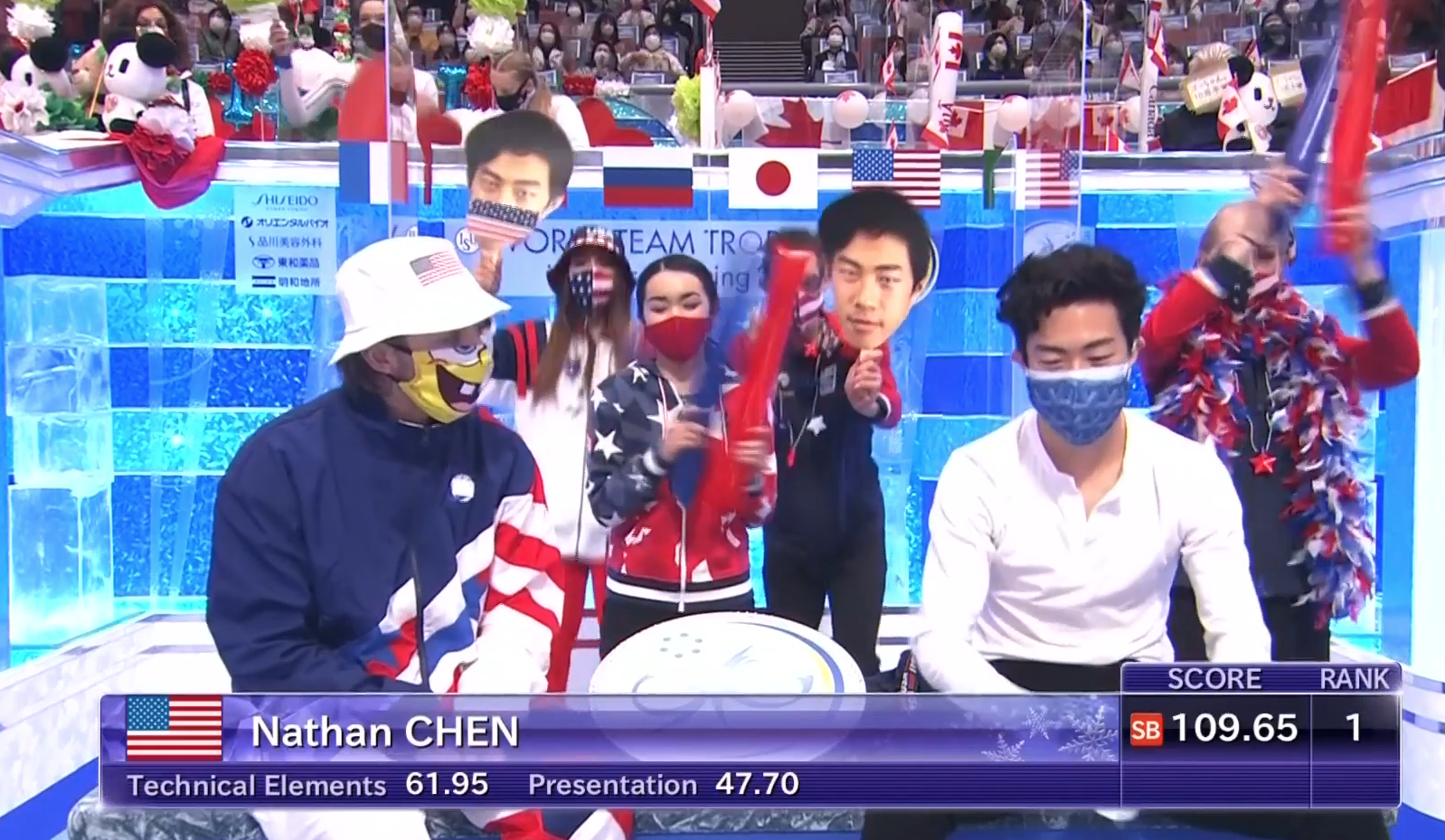At World Team Trophy, another angle on Chen-Hanyu rivalry
/Nathan Chen and his U.S. teammates see his winning scores in the World Team Trophy short program. (Screenshot from Peacock TV)
Thanks to NBC’s Peacock TV for the ability to watch the World Team Trophy from Osaka, Japan, at a reasonable hour in the USA via replay.
It meant I was awake enough to make some (hopefully) coherent observations after Thursday’s day one (of three), which included singles short programs and the rhythm dance.
In no particular order of importance:
1. The team outcome seems a foregone conclusion (just as it likely will be at the 2022 Olympics), given that Russia has a team with the reigning world champions in women’s singles, pairs and dance, plus two very solid men.
2. Yuzuru Hanyu’s quadruple salchow opening the short was one of the most beautifully executed quads I ever have seen. The three judges (of seven) who gave him only +4 GOE instead of the max +5 must have been half asleep. FWIW, they were the French, Italian and Russian judges.
3. I used to think (at least until the 2018 Olympic free skate) that Japan’s Hanyu was so dominant, particularly in component scores, that he could make one semi-serious mistake and still win in any program.
Nathan Chen has shown that thinking no longer prevails, particularly among judges.
Two-time Olympic champion Hanyu’s botched triple axel landing Thursday was the main factor in his being 2.68 points behind three-time world champion Chen in the technical scores. That is a gap Hanyu would once have figured to overcome in PCS scores.
But Chen, who was judged clean (with a magnificent quad flip), lost just .15 to Hanyu in the second set of marks and won overall by 109.65 to 107.12.
Were the judges’ PCS scores gracious to Chen? Yes. But so were the scores of the two judges who did not give Hanyu a negative GOE on the hash of an axel (their grades were a neutral 0) and the five who gave him just -1.
4. Battle of the Brians notwithstanding, Hanyu-Chen is the most compelling men’s rivalry in my 41 years of writing about the sport.
(To be fair, that may have to do with being able to watch every figure skating event through some medium, which was not the case when Brian Boitano of the U.S. was battling Brian Orser of Canada from 1985 through 1988, when Boitano won the Olympics.)
5. The other top rivalry in those four decades was between Russians Alexei Yagudin and Evgeny Plushenko, both once coached by the redoubtable Alexei Mishin. Yagudin won the 2002 Olympics and four world titles from 1998 through 2002; in those years Plushenko won three world medals (gold, silver, bronze) and Olympic silver.
6. The big difference between the Hanyu-Chen and Yagudin-Plushenko rivalries was Yagudin had retired from competition before Plushenko hit his peak from 2003 through his Olympic title in 2006. Hanyu’s peak has been from his first Olympic title in 2014 through his second in 2018, but, to his credit, he has both remained in the sport and also remained the only real challenger to Chen since 2018. If there is anything we have learned about Hanyu, it is never to count him out.
7. And don’t forget the interesting rivalry between Plushenko and his ego, with the latter winning out despite a competitive record so remarkable by any measure that Plushenko would not have needed to indulge in self-aggrandizement.
8. Jason Brown was Jason Brown: striking to watch, quad or not. He finished third despite having just the seventh highest technical scores. (And, yes, his PCS should have been higher than third.) Once again, it will be in the free skate where his lack of quad(s) make it very hard for Brown to keep up.
9. The more I see it, the more Kevin Aymoz’ short program strikes me as cultural appropriation.
10. I would be happy to see reigning world champion Anna Shcherbakova of Russia keep for one more season her current short program, to Massenet’s elegiac “O sweet spring of yore.” She skated it brilliantly again Thursday, and her expression of longing perfectly captured music that could not fit her better.
11. For all that and a personal best score of 81.07, Shcherbakova barely beat her getting-better-with-age teammate, Elizaveta Tuktamysheva, whose 80.35 was just a whisker below her PB. LaTuk’s triple axel was of stunning quality, even if the Japanese judge gave it just a +1.
12. Neither U.S. woman, Bradie Tennell (two negative GOEs, with one jump under-rotated and another a quarter-rotation short) and Karen Chen (fall, UR, q), had much of a day. Tennell, who lacked spark, was fifth (67.40). Chen was a distant sixth at 62.48.
13. Kaori Sakamoto’s double axel. Kaori Sakamoto’s double axel.
Twice as good as anyone else’s. Deserved all +5 (she got three +5, four +4.)


